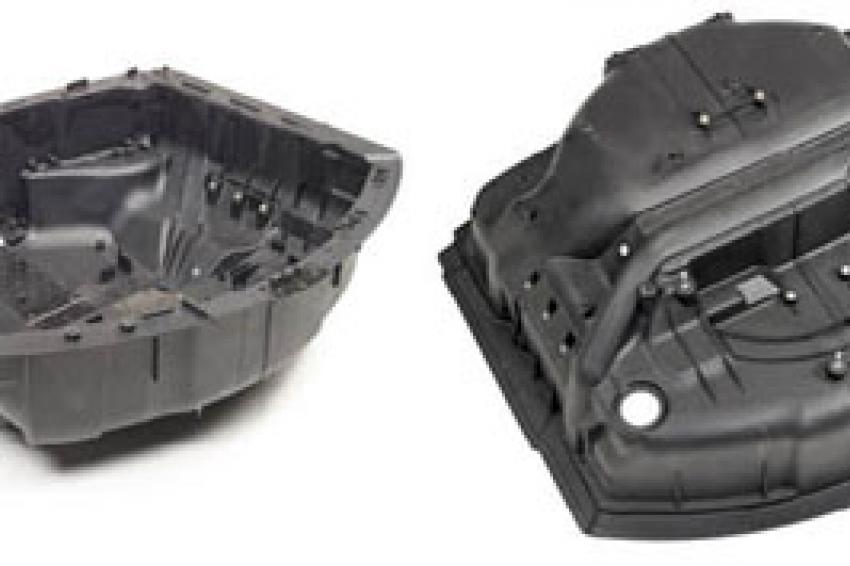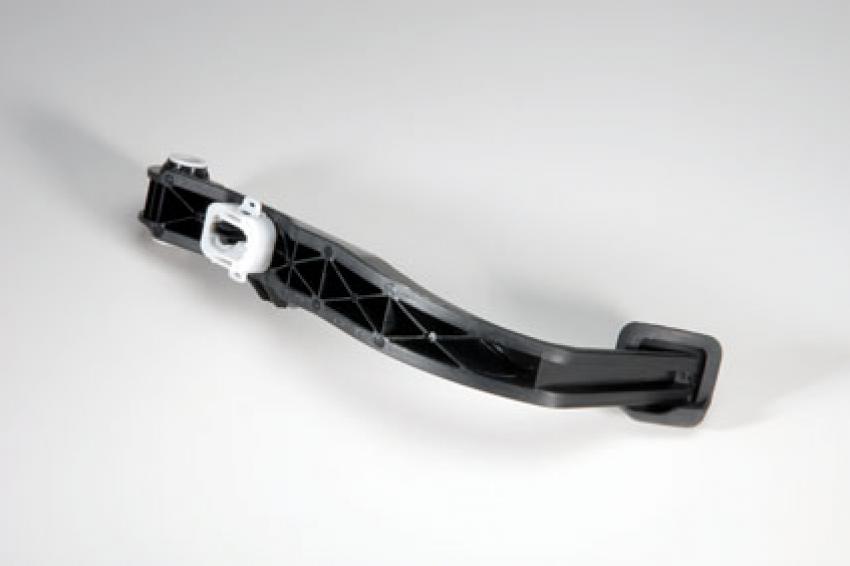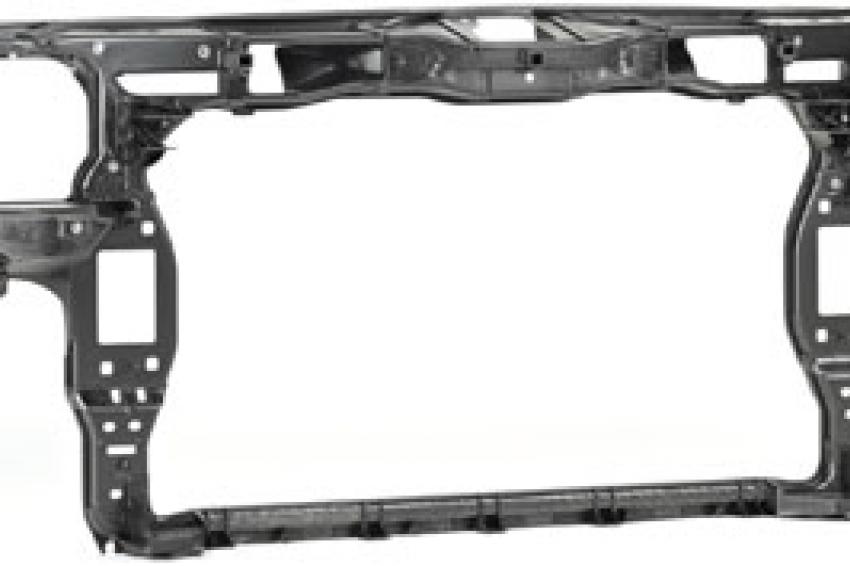Every Gram Counts
New Possibilities In The Design of Lightweigtht Plastic Components
Easy-flowing, highly reinforced polyamides and polyesters, foamable thermoplastics and innovative material composites with organic sheet are opening up new possibilities in the design of lightweight plastic components. These materials often offer an alternative to metals.
The automotive industry continues to be a key source of inspiration for the lightweight construction sector. For reasons of climate protection, the industry has to achieve major reductions in weight and fuel consumption of the vehicles it manufactures. Every 100 kg saved cuts a vehicle‘s CO2 emissions by around 13 g/km. The intelligent use of plastics offers a major potential here.
From Thin to Ultra-Thin Wall Technology
Exceptionally easy-flowing polyamide (PA) 6, 66 and polybutylene terephthalate (PBT) grades are particularly promising in this regard. Lanxess markets these under the names Durethan Easyflow, Durethan Xtreme Flow and Pocan Xtreme Flow. The polyamides in the Easyflow range, for example, can achieve melt flow paths that exceed those of comparable general-purpose polyamides by 50 %. The Xtreme flow polyamides are a further 10 - 20 % easier flowing than the Easyflow grades. These excellent flow properties mean the materials can be used to make components much thinner and therefore lighter than before.
Highly Reinforced Polyamides - Extremely Strong And Stiff
Easy-flowing plastics can be reinforced with far higher quantities of glass fibers and other fillers. One such example is Durethan DP BKV 60 H2.0 EF, a polyamide 6 with a glass fiber content of 60 %. With an elasticity modulus of over 20,000 MPa, this high-tech material is exceptionally stiff. This makes it ideal for designing components that can cope with high dynamic stresses but are also lighter. It was therefore possible to use plastic-metal composite technology (hybrid technology) and the highly filled polyamide 6 to manufacture a series-produced front end. {Fig. 1}.
Thanks to its high stiffness, this material can be used in applications previously dominated by sheet steel, aluminum and glass-mat-reinforced thermoplastics (GMT). One current application {Fig. 2} is the spare wheel recess with integrated reinforcing channels in the new Audi A8 unusually large for an injection-molded part. In addition to its primary function, the spare wheel recess also reinforces the rear end of the car. The polyamide 6 makes a major contribution to the high overall stiffness. The material also enables precise injection molding of the component‘s complex geometry. It was also possible to integrate several functions directly.
The Evolution of Hybrid Technology - Organic Sheet Replaces Sheet Metal
The aforementioned hybrid technology with sheet steel and polyamide is well established in the production of car front ends that can cope with high loads but are also lighter and highly integrated. Well over 40 million cars have now been fitted with these structural bodywork components made of sheet steel and the polyamide 6 Durethan BKV 30 H2.0. In addition to pedal support brackets and components for car roof frames, this hybrid technology is now also being used in the production of brake pedals for vans. The hybrid pedals {Fig. 3} are around 40 % lighter than their pure steel counterparts.
Hybrid technology is about to make a major leap forward thanks to organic sheets. The flat semi-finished products consist of a thermoplastic matrix reinforced with a fabric made of such materials as glass fiber, carbon fiber or suitable mixed fibers. Organic sheets are far lighter than steel or aluminum. In hybrid technology, they therefore offer a lightweight alternative to metal sheets. Although these all-plastic composites do not quite match the stiffness of a typical plastic/metal composite made from polyamide 6 and sheet steel during the initial phase of flexural loading, the maximum load limit is far higher. And, as failure from the collapse of the structure occurs later, each component is able to absorb more energy in the event of a crash.
Series Production of First Organic Sheet Hybrid Component
The manufacturing process for organic sheet hybrid components has been optimized so that high volumes can now be produced cost-effectively. A hybrid front end featuring not only aluminum but also organic sheets was recently put into series production in the Audi A8 for the first time {Fig. 4}. The lightweight construction material is used to create a thin U-section on the lower beam of the front end. The easy-flowing polyamide 6 Durethan BKV 30 EF is used as the injection molding material. Lanxess expects that, in the future, hybrid front ends will also be produced in series as all-plastic parts with organic sheet and Durethan. These new hybrid systems offer further opportunities to cut component weight by around 10 %. In automotive technology, there is also good potential for organic sheet hybrid technology in applications that rely on high surface stiffness, such as spare wheel recesses, bulkheads and vehicle floor components.
Foamed Polyamide - Light Weight with Excellent Surface Quality
Foamed injection-molded parts represent a further application in the field of plastic lightweight construction. Compared with solid molded parts, these save both on materials and weight - cutting component weight by up to 10 % and, in some cases, as much as 20 %. Nevertheless foaming processes have in the past been unsuccessful in gaining widespread acceptance for use in injection molding. The main reason was the poor surface quality of the resulting components. However, this is no longer a problem with the polyamide 6 Durethan BKV 35 CX H2.0 and the polyamide 66 Durethan AKV 35 CX H2.0, both developed for physical and chemical foaming. They yield excellent molded part surfaces that in most cases are smooth and flawless with virtually no opalescent streaks or areas that appear porous. Consequently, they are suitable for manufacturing components of a high optical quality.









